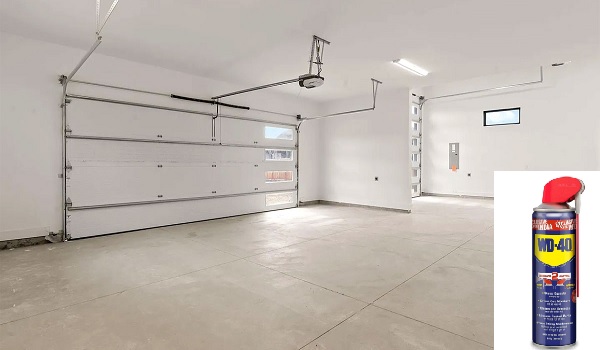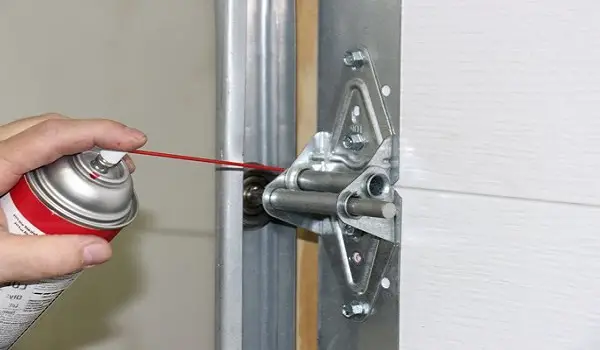When it comes to maintaining your garage door, proper lubrication is essential.
A smoothly functioning garage door not only adds convenience to your daily life but also ensures the safety of your property and loved ones.
Among the numerous lubricants available, one that often comes to mind is WD-40. Is WD-40 really the right solution for lubricating your garage door?
In this article, I’ll provide you with insights based on my first-hand experience and knowledge to help you make an informed decision about lubricating your garage door.
What is WD-40?
WD-40 is a widely recognized multi-purpose spray that’s been around for decades.
The name stands for “Water Displacement, 40th formula,” which highlights its original purpose of repelling moisture and preventing corrosion.
While it’s highly effective for tasks like loosening bolts, displacing water, and preventing rust, it’s important to understand its limitations, especially in the context of your garage door.
Can WD-40 Be Used on Garage Doors?

WD-40’s popularity might lead you to believe that it’s an ideal choice for lubricating your garage door.
This assumption is not entirely accurate. WD-40 is not a dedicated garage door lubricant, and there are several reasons why it’s not the best option for this purpose:
- Temporary Solution: WD-40 is designed to be a quick fix. While it might temporarily reduce friction and eliminate squeaking, its effectiveness wears off relatively quickly, requiring frequent reapplication.
- Thin Consistency: WD-40 has a thin consistency, which means it can easily drip and create a mess on your garage floor. Additionally, its thin nature doesn’t provide the long-lasting lubrication that a garage door requires.
- Lack of Long-Term Protection: Garage doors are exposed to varying weather conditions, and they need a lubricant that can withstand these challenges. WD-40, however, is not designed to provide long-term protection against rust and corrosion.
What Should You Use to Lubricate Your Garage Door?
WD-40 can be used to temporarily lubricate a squeaky garage door, but it is not the best long-term solution. WD-40 is a water-displacing lubricant, which means it is good at displacing moisture and preventing rust.
It is not a true lubricant and can actually damage plastic, nylon, or rubber components. This is especially true if your garage door has nylon rollers. WD-40 can also damage a garage door’s powder coat finish.
The best lubricant for a garage door is a synthetic oil designed to prevent rusting, corrosion, sticking, and squeaking on metal parts. Some good options include:
- Clopay Pro Lube is a silicone spray lubricant that is specifically designed for garage doors. It is non-toxic, water-resistant, and will not damage plastic or rubber components.
- Garage Door Lube is another silicone spray lubricant that is available at most hardware stores. It is also non-toxic and water-resistant.
- Blaster Garage Door Lubricant is a petroleum-based lubricant that is more commonly used for automotive applications. However, it can also be used on garage doors. It is thicker than silicone lubricants and can provide more long-lasting lubrication.
- Genie Garage Door Lubricant is a synthetic oil lubricant that is also available at most hardware stores. It is similar to Blaster Garage Door Lubricant, but it is thinner and dries faster.
- DuPont Garage Door Lubricant is a premium synthetic oil lubricant that is designed to provide long-lasting lubrication and protection against rust and corrosion. It is more expensive than the other options, but it is a good choice if you want the best possible protection for your garage door.
These lubricants are specifically designed for garage doors and will not damage the plastic, nylon, or rubber components. They will also help to prevent rust and corrosion, which can extend the life of your garage door.
How to Lubricate Your Garage Door

Lubricating your garage door isn’t a complex task, and it’s a crucial aspect of its maintenance. Here’s a step-by-step guide:
- Preparation: Gather the necessary tools, including a garage door lubricant and a clean cloth.
- Cleaning: Wipe down the tracks, rollers, hinges, and springs with the clean cloth to remove dirt and debris.
- Application: Apply the garage door lubricant to the moving parts, focusing on the hinges, springs, rollers, and tracks. Be sure to follow the manufacturer’s instructions.
- Excess Removal: Wipe away any excess lubricant to prevent buildup and dripping.
- Operational Check: Open and close the garage door several times to ensure smooth operation.
Complete Guide: How to Lubricate Garage Door
Conclusion
In conclusion, while WD-40 might be a household name, it’s not the best choice for lubricating your garage door.
To ensure the optimal performance, longevity, and safety of your garage door, invest in a high-quality garage door-specific lubricant.
By following the proper lubrication techniques, you can prevent issues like squeaking, rust, and corrosion, keeping your garage door in impeccable working condition.
So, the next time you wonder, “Can I use WD-40 on a garage door?” remember that choosing the right lubricant is key to a well-maintained and smoothly operating garage door.


